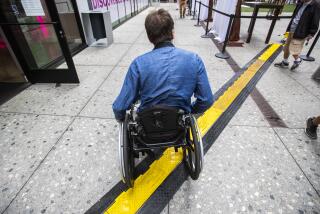Serving Hope With Cappuccino
- Share via
BRATISLAVA, Slovakia — At the Radnicka cafe, tucked inside Bratislava’s medieval City Hall, waiter Frantisek Toth might have to ask three or four times what kind of coffee you’d like.
Anywhere else, a customer might get aggravated and leave. Here, almost nobody does--not after an encounter with the smiling Toth and his sincere apologies.
Dealing with people like Toth, one of the cafe’s five waiters with mental retardation or severe learning disabilities, is a new experience for most Slovaks.
Until the fall of communism in 1989, disabled people were usually shut away in state institutions. Such people, the communist authorities believed, were better off isolated from the “healthy population.”
The Radnicka, whose name means “little city hall,” opened last year and is an example of a significant shift in this nation of 5.4 million people toward integrating the mentally and physically disabled into everyday life.
“There’s no other way ... we must learn how to live together,” said Viera Zahorcova, director of the Agency for Supported Employment, which is helping to train people with disabilities.
The Slovak government hasn’t counted the nation’s handicapped, but estimates that it is 2% to 8% of the population.
Some people worried that Slovakia’s 20% unemployment rate might make it difficult to start putting the handicapped into the workforce, but there hasn’t been any public criticism.
Still, starting the Radnicka wasn’t easy.
It took a lot of energy to persuade officials the project could work, Zahorcova said. After financing was secured, and City Hall donated space for the cafe, the disabled workers had to be trained to brew coffee, interact with strangers and handle other aspects of running a cafe.
Zahorcova urges Slovaks not to come to the cafe out of charity and sympathy, but because it offers friendly service--if a bit slow at times--and a pleasant atmosphere in one of Bratislava’s most charming old buildings.
“I’ll definitely come back,” said Elena Herkova, browsing the handcrafts made by disabled artisans and offered for sale at the cafe. “It’s a great idea in a good location.”
Toth isn’t very talkative, but he says he loves his job, the best one he’s ever had. Dressed in his uniform of dark pants, white shirt and blue vest, he serves customers while another waiter who has no disabilities deals with money.
“It’s a good job ... I like to serve people, and I especially like to make coffee, be it Viennese [with whipped cream] or cappuccino,” said Toth, 23, who needed six months’ training before he could face customers.
For companies with 20 or more employees, Slovak law requires that for every 20 workers, the equivalent of one full-time job be set aside for the disabled. Companies that are unable to provide such positions must pay $350 to $700 to the labor office in lieu of each job. The money goes for training and job creation for the disabled.
Some employers, such as health care facilities, the military and fire departments, are exempt.
Maria Orgonasova, president of the Alliance of Organizations of Disabled People in Slovakia, said it will take a few generations for Slovak businesses to learn how to employ such people and for the disabled to learn how to present themselves “with their education or skills, and not with the type of disability they have.”
“The young disabled feel they are already integrated,” Orgonasova said. “It is a bit more difficult with the older, who are used to institutions.”
More to Read
Sign up for Essential California
The most important California stories and recommendations in your inbox every morning.
You may occasionally receive promotional content from the Los Angeles Times.










